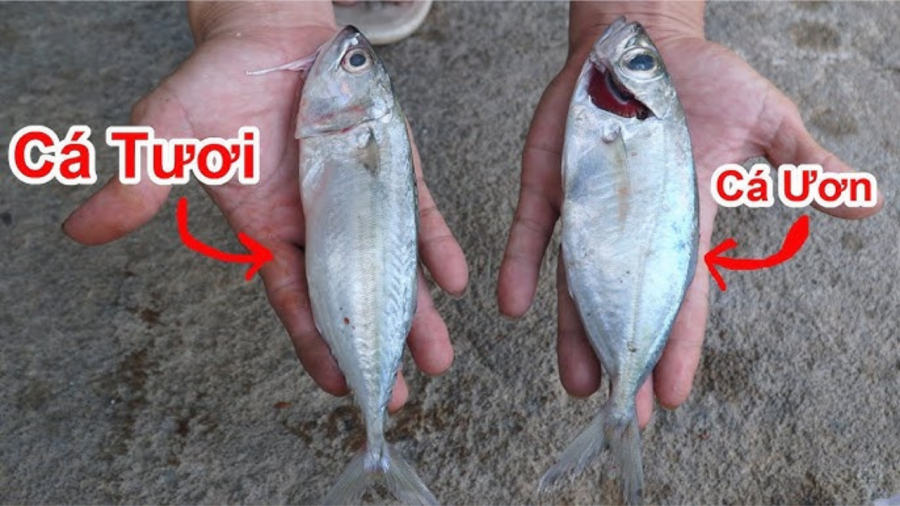Unpleasant Smelling Fish

It is not advisable to buy fish with a strong unpleasant odor as they are no longer fresh. Additionally, do not buy fish with a petrol-like smell as these types of fish live in polluted water environments. These fish can contain heavy metals, which can be harmful when consumed.
Fish that has been sanitized to prolong its freshness is also easily identifiable. To keep the fish fresh for longer, the sellers have used formaldehyde to soak the fish, which acts as a disinfectant and enhances its color.
Scaly and Dull-Skinned Fish

When a fish is stale or close to dying, its scales will peel off. Fish with loose scales may harbor a significant amount of bacteria that can be harmful when consumed. Therefore, when buying fish, choose ones with shiny and firmly attached scales.
Cloudy Eyes and Dark Gills
Fresh fish have transparent and shiny eyes, with vibrant red gills. On the other hand, the eyes of stale or dead fish will appear cloudy, and the gills may be dark. Therefore, to select fresh fish, buyers can examine the eyes and gills of the fish.
Swollen Abdomen Fish
An enlarged abdomen indicates that the fish has been dead for a long time. Fish with a swollen belly usually have deteriorated flesh, a strong foul odor, and contain a high level of bacteria. Consuming this type of fish can affect the digestive system.
Frozen Fish for Too Long

When fish is frozen for an extended period, its flesh turns pale, deteriorates, loses freshness, and its nutritional value decreases. Additionally, long-frozen fish may be preserved using formaldehyde, which is highly dangerous and can cause skin, eye, and nasal irritations, as well as an increased risk of cancer.
Some Tips for Eating Fish for Good Health
Scientific Fish Consumption
According to experts’ recommendations, individuals should consume fish at least twice a week to ensure they receive sufficient nutrients. Especially, types of fish with high levels of Omega-3 fatty acids should be consumed at a serving size of 100 grams per meal.
Fish Can Also Be Infected with Parasites
Fish is a food item that is easily prone to parasite infection, as they may ingest eggs from the external environment. When these eggs enter the animal’s body, they develop into larvae, cysts, and reside in the organs. When fish is not properly processed for hygiene, these parasites remain and can infect humans, residing in the intestines for many years. This can lead to severe abdominal pain, weight loss, and anemia. Therefore, it is important to properly process fish to ensure food safety and prevent diseases.
In particular, eating raw fish, such as in sushi or raw fish salad, carries a higher risk of bacterial and parasite infection. Despite being prepared, raw seafood dishes always have a higher risk of illness compared to cooked seafood. Therefore, be cautious when consuming raw or partially cooked seafood dishes.
Limit Fried Fish
One of the ways to process fish that reduces its nutritional value is frying, especially deep frying. Consuming a lot of fried foods increases the risk of heart disease and stroke. According to a study on older women, consuming fried fish once a week was associated with an additional 48% risk of heart failure. Therefore, experts recommend preparing fish by baking or steaming to preserve its nutrients.
Avoid Eating Fish on an Empty Stomach
A vital note when eating fish is to avoid doing so on an empty stomach. Eating fish on an empty stomach can increase the amount of purine metabolized into uric acid, which can cause tissue damage. Tissue damage is the main cause of gout. Therefore, to avoid the risk of gout, one should not eat fish on an empty stomach. This is a harmful habit that we should eliminate.
Fish Bile is Not Good for the Body
According to doctors, especially traditional medicine practitioners, fish bile can be used as medicine to treat various diseases such as eye pain, redness, sore throat, and malignant ulcers.
However, in reality, this is extremely dangerous. Consuming fish bile can easily lead to poisoning and even endanger life, especially with catfish and carp bile. This is because fish bile often contains tetrodotoxin, which is considered harmful to the nervous system and can cause fatigue, respiratory distress, and behavioral disorders. Therefore, it is important to note not to consume fish bile to avoid health risks.
Unlocking the Simple Solution to Combatting Odors of All Types of Meat
 Odors of All Types of Meat’>
Odors of All Types of Meat’>In order to ensure that your meat-based dishes not only taste great, but also do not give off any unpleasant odor, it is essential to find ways to deodorize popular meats such as beef, pork, chicken, and fish.
8 Common Mistakes People Make with Cutting Boards
Are you using your cutting board correctly? Many Vietnamese households rely on cutting boards in their kitchen, but not everyone knows how to use them properly, especially when it comes to wooden cutting boards. Check out these 8 mistakes to avoid when using a cutting board to ensure both hygiene and safety for everyone in your family.




































